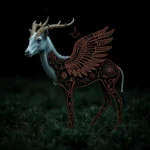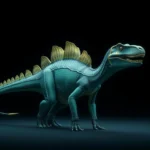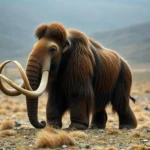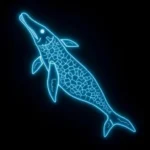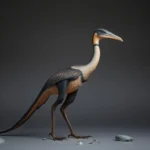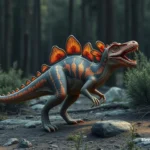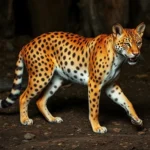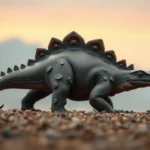The Symbolism of Amphicoelias Fragillimus: A Journey into Prehistoric Wisdom
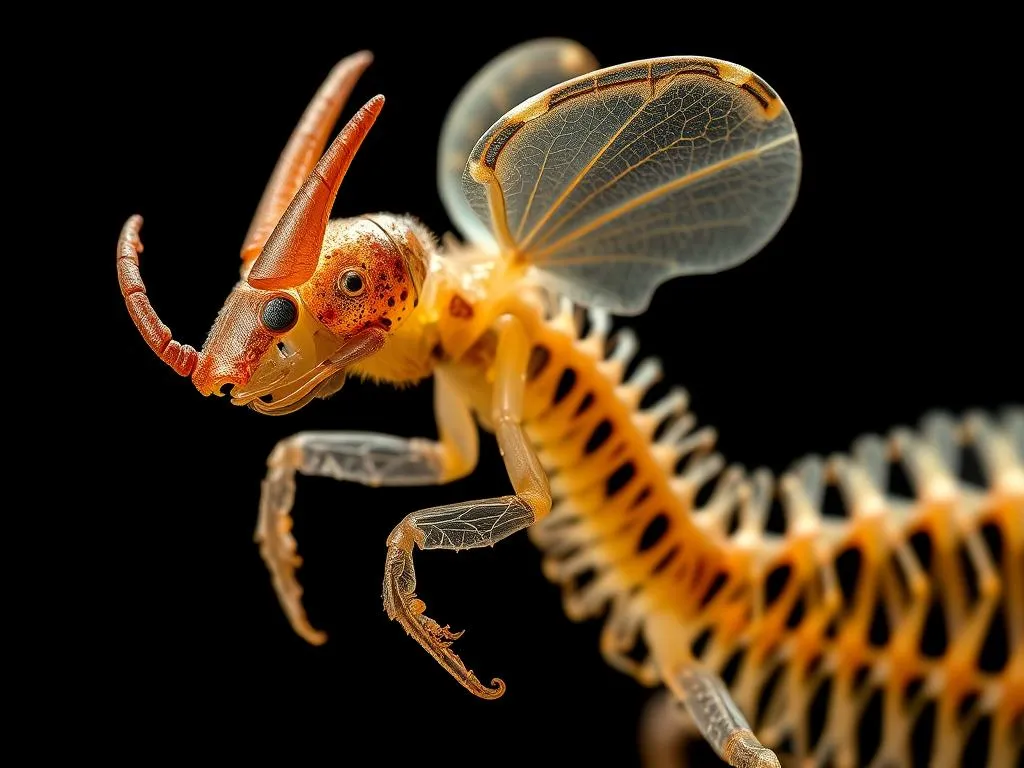
Disclaimer: Some images on this website are AI-generated artworks and may not accurately represent real animals.
Understanding Amphicoelias Fragillimus
Overview of the Species
Amphicoelias fragillimus is one of the most fascinating and enigmatic dinosaurs known to science. This colossal sauropod lived during the Late Jurassic period, approximately 150 million years ago. Its immense size and unique characteristics have captivated paleontologists and enthusiasts alike.
Description of its Physical Characteristics
The physical attributes of Amphicoelias fragillimus are nothing short of remarkable. Measuring over 100 feet long, it is believed to be one of the largest land animals to have ever existed. Its long neck and massive body were supported by sturdy legs, and its tail was likely used for balance as well as communication.
| Physical Characteristic | Description |
|---|---|
| Length | Over 100 feet |
| Weight | Estimated up to 120 tons |
| Neck Length | Possibly over 40 feet |
| Tail Length | Roughly equal to the body length |
| Body Structure | Long, slender, and robust |
Habitat and Geographical Distribution
Amphicoelias fragillimus roamed the lush, verdant landscapes of what is now the western United States. Its habitat consisted of abundant vegetation, which provided ample food resources. The geological formations of this era were vastly different, featuring vast floodplains and temperate climates conducive to large herbivores.
Historical Significance in the Dinosaur Era
The significance of Amphicoelias fragillimus in the context of dinosaur history cannot be overstated. As one of the largest sauropods, it represents a peak in dinosaur evolution, showcasing the incredible adaptations that allowed these creatures to thrive in their ecosystems. Its size alone prompted discussions about the ecological dynamics of the Jurassic period, raising questions about the role of mega-herbivores in shaping their environment.
Unique Features
Size and Structure: The Colossal Nature of Amphicoelias
The sheer size of Amphicoelias fragillimus is a subject of fascination. Its long neck allowed it to reach high vegetation, while its massive body provided stability. Interestingly, its vertebrae were unique; they were hollow, reducing weight without compromising strength. This anatomical adaptation is one of the reasons it could grow to such enormous proportions.
Distinct Anatomical Adaptations
Amphicoelias fragillimus possessed unique features that distinguished it from other sauropods. Its vertebrae exhibited a remarkable amphicoelous structure, meaning both ends of the vertebrae were concave. This structure provided greater flexibility and resilience, crucial for a creature of its size.
Comparison with Other Sauropods
When compared to other sauropods, Amphicoelias fragillimus stands out not just for its size but also for its unique anatomical features. Unlike the massive but stocky Brachiosaurus, Amphicoelias was more elongated, allowing for a different feeding strategy. Additionally, its lightweight skeletal structure sets it apart, making it an intriguing subject for evolutionary studies.
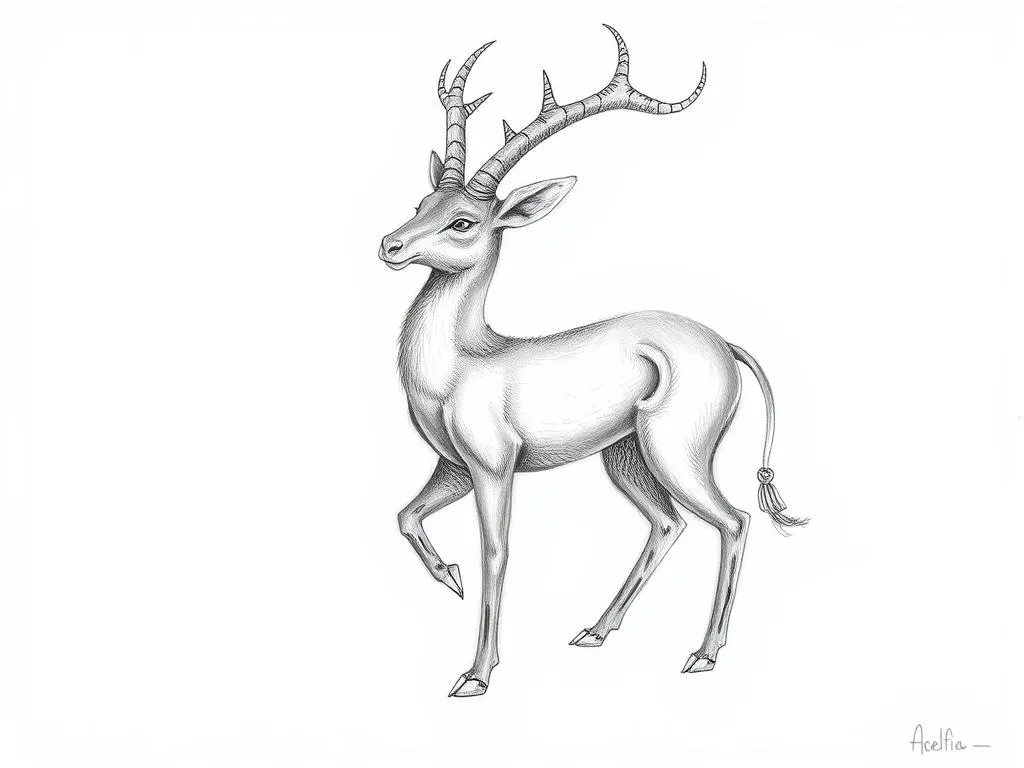
Symbolism & Spiritual Meaning
The Colossus of the Past
The symbolism of Amphicoelias fragillimus extends beyond its physical characteristics. It represents strength and endurance, embodying the resilience of life that has persisted through eons. In various cultures, large creatures are often seen as symbols of power, and Amphicoelias fits this narrative perfectly.
Representation of Strength and Endurance
As an emblem of strength, Amphicoelias fragillimus teaches us about the endurance necessary to thrive in challenging environments. Its ability to adapt and grow in size reflects the power of resilience, reminding us that even in adversity, strength can manifest.
The Significance of Size in the Natural World
In the natural world, size often carries significant meaning. Large animals typically command respect and admiration, portraying dominance and stability. Amphicoelias fragillimus, with its colossal frame, serves as a reminder of the might of nature and the importance of respecting it.
Connection to Nature and the Earth
Symbol of Stability and Grounding
Beyond its sheer size, Amphicoelias fragillimus symbolizes stability and grounding. Its massive form connects it deeply to the earth, suggesting a relationship with nature that is both profound and essential. This connection serves as a powerful reminder of our place within the natural world and the importance of nurturing that bond.
Relationship with the Ecosystem of its Time
The existence of Amphicoelias fragillimus also highlights the intricate relationships within ecosystems. As a herbivore, it played a crucial role in shaping the flora of its environment. Its feeding habits would have influenced plant growth and distribution, demonstrating the interconnectedness of life forms and their habitats.
Lessons from Extinction
Reflections on Adaptability and Change
The extinction of Amphicoelias fragillimus offers valuable lessons about adaptability and change. It serves as a reminder that even the mightiest can fall, emphasizing the importance of being adaptable in the face of changing circumstances. The story of this giant encourages us to embrace transformation rather than resist it.
The Importance of Legacy and Memory
The legacy of Amphicoelias fragillimus is not just one of size but also one of memory. Its existence prompts us to reflect on the past and consider what we can learn from it. The stories of ancient beings can guide us in our present lives, urging us to preserve our environment and honor the legacies that shape our world today.
Amphicoelias Fragillimus in Dreams
Dream Interpretation
Dreams featuring Amphicoelias fragillimus can be particularly potent. Encountering this giant in a dream may symbolize a confrontation with your own strength or potential. It invites you to examine aspects of yourself that are powerful yet perhaps underutilized.
Symbolism of Large Creatures in the Dream World
Large creatures in dreams often represent significant emotions or experiences. They can embody feelings of being overwhelmed or signify the presence of immense power in your life. Amphicoelias, in particular, symbolizes not just physical strength but also the wisdom of the ages.
| Dream Element | Possible Interpretation |
|---|---|
| Encountering Amphicoelias | Confronting your own strength |
| Feeling small around it | Overwhelmed by challenges |
| Riding on its back | Embracing power and confidence |
Themes of Transformation
The Journey from the Prehistoric to the Modern Mindset
Dreaming of Amphicoelias fragillimus might also represent a transformative journey. It symbolizes the transition from ancient wisdom to modern understanding, encouraging you to integrate the lessons of the past into your current life.
Personal Growth and the Power of Ancient Wisdom
The presence of this ancient giant in dreams can serve as a powerful metaphor for personal growth. It invites you to harness the wisdom of the ages, drawing inspiration from Amphicoelias to cultivate strength, resilience, and a deep connection to the world around you.
Modern Interpretations
Cultural References
In contemporary culture, Amphicoelias fragillimus has found its way into various forms of art and literature. It serves as a powerful symbol in stories and artworks that explore themes of nature, strength, and the passage of time. Documentaries and scientific explorations have also popularized this dinosaur, sparking public interest in prehistoric life.
Representation in Art and Literature
The depiction of Amphicoelias in art often emphasizes its grandeur. Artists portray it as a majestic creature, invoking awe and admiration. Literature, on the other hand, often uses the creature as a metaphor for strength and resilience, weaving it into narratives that explore human nature and our relationship with the earth.
Role in Popular Culture and Documentaries
Documentaries about dinosaurs frequently highlight Amphicoelias fragillimus due to its size and unique characteristics. These programs educate viewers about the significance of such giants in our understanding of evolutionary biology and the history of life on Earth.
Lessons for Today
Environmental Conservation and the Legacy of Giants
The story of Amphicoelias fragillimus carries an important message about environmental conservation. As we face escalating ecological challenges, the legacy of this ancient giant reminds us of the importance of preserving our planet for future generations.
The Importance of Understanding Our Prehistoric Past in Shaping the Future
Understanding the world of Amphicoelias and other prehistoric beings allows us to glean insights into the past that can inform our future. By studying these giants, we can learn valuable lessons about adaptability, coexistence, and the impact of environmental changes on living organisms.
Key Takeaways
- Amphicoelias fragillimus embodies strength and endurance.
- Its symbolism serves as a reminder of our connection to nature and the earth.
- The lessons from its extinction call for adaptability and an appreciation of legacy.
- In dreams, encountering this dinosaur can signify personal growth and reflection on one’s strength.
- Cultural representations highlight the continuing relevance of Amphicoelias in understanding our world.
Conclusion
In reflecting upon the significance of Amphicoelias fragillimus, we uncover a rich tapestry of symbolism and meaning that resonates across time. This ancient giant invites us to explore our connections to nature, to honor the lessons of the past, and to acknowledge the enduring power of strength and resilience. As we navigate our modern lives, let us take a moment to consider what Amphicoelias symbolizes in our own journeys. The echoes of its existence continue to inspire and challenge us, urging us to forge a deeper connection with both our history and our environment.
